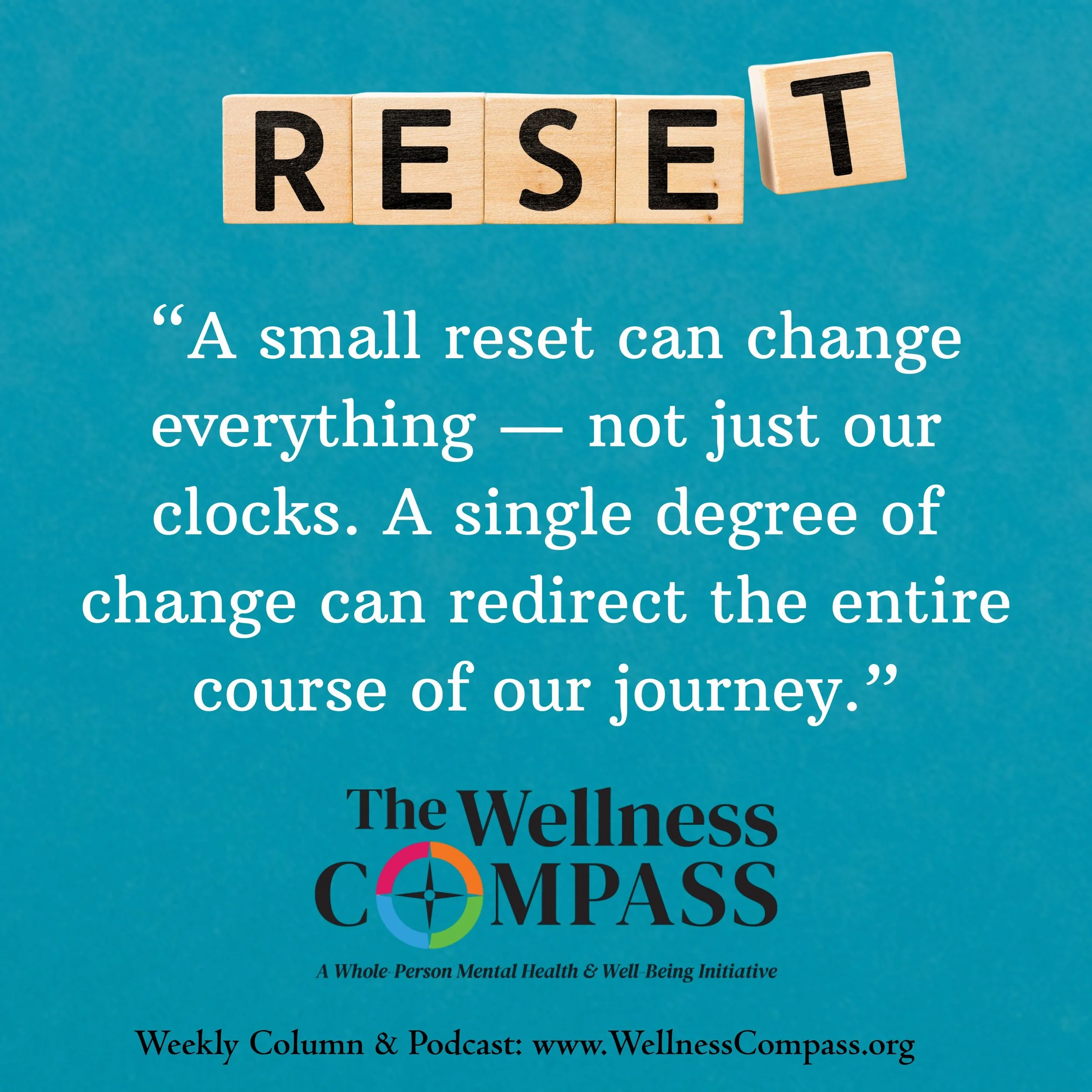Taking Time to Reset
The Wellness Compass Initiative is our partner community wellness initative that serves schools, counseling centers, nonprofits, universities, and other community wellness organizations. Each week Holly Hughes Stoner and Scott Stoner, who are both licensed marriage and family therapists, co- write a column for Wellness Compass and we are pleased to share it here on our Living Compass site. There is also a Wellness Compass podcast, where Scott and Holly elaborate on the topic of this column each week, at www.wellnesscompass.org/podcast. or in any podcast app (Apple, Google, Spotify, etc).
Taking Time to Reset
Having just reset our clocks this week, we know that this simple adjustment—moving backward by a single hour—can change our entire rhythm. For some, the change was not a big deal; for others, it is still affecting their sleep schedules (or those of their kids or pets). But here's the good news: within a few days, most of us recalibrate and adapt.
This semi-annual ritual reminds us that the power of a small reset can change our perspectives. When we consciously shift our perspectives, we can transform our experience of life just as dramatically as changing our experience of the sun rising and setting.
Small Shifts Can Create Big Changes
The key is recognizing that our perspectives are a choice. When we feel stuck, we often think our external situation must change before we can feel different. But what if the "reset" we need isn't in our circumstances but in how we're looking at them? A relationship conflict might shift when we stop asking "who's wrong?" and start asking "what does this relationship need?"
We have all had the experience of negatively judging someone's behavior, and then shifting our reaction from judgment to compassion when our perspective changed with additional information about why a person is acting the way they are.
Perspective Shapes Experience More Than Facts Do
Two people can experience the same time change and have entirely different perspectives. One embraces the earlier sunrise while the other curses the earlier sunset. Another person is irritated because they believe the government should end daylight saving time altogether.
Our brains are meaning-making machines, constantly interpreting and narrating our lives. Two people receive the same email from their boss that offers constructive feedback. One person finds the email helpful and motivating. The other finds it demoralizing and shaming. All of our experiences are filtered through our perspective. It's been said that we don't see things as they are, but often we see them as we are. This is why checking out our perspectives with others can be helpful, rather than assuming they are always accurate and useful.
Resistance to Resetting Keeps Us Stuck
Mindset, a popular bestselling book by Carol Dweck, outlines the crucial difference between a fixed and a growth mindset. A growth mindset is characterized by an openness to changing and resetting our views and perspectives. A fixed mindset is just what it sounds like—its motto is, "but I/we have always done it this way." Resistance to resetting our perspectives rarely serves us well, and almost always impedes growth.
In our world today, changing one's perspective is often seen as a weakness. Nothing could be further from the truth. As we grow and mature and gain new information and experiences, it is only natural for our perspectives to shift. And even if the shift is slight, like a ship changing its bearing just a few degrees, that small change will create a larger shift over time.
Readjusting Is an Ongoing Practice
We don't reset our clocks once in a lifetime. Similarly, perspective shifts aren't one-time events but ongoing practices. Our go-to viewpoints reassert themselves, old patterns return, and we need to consciously see if it's time to readjust again and again.
This isn't failure—it's being human. The practice is in noticing when we've drifted back into unhelpful perspectives and gently adjusting our compass. Each time we do this, we strengthen our ability to shift. We become more fluid, more resilient, more capable of meeting life's challenges with creativity, rather than rigidity.
Making It Personal:
1. Where in your life have you been holding a fixed mindset that could benefit from greater openness to growth? What slight shift could you make this week?
2. Think of a situation where you are harshly judging a friend, family member, or colleague's behavior. Might a shift in perspective open you to softening your judgment and feeling empathy or compassion?
3. Can you think of a time when shifting your perspective regarding how you viewed yourself, a situation, and/or another person created an opportunity for moving from being stuck to experiencing new possibilities? What can you learn from that?
Subscribe Now to Weekly Words of Wellness:
Click the button below to signup for the e-mail version of Weekly Words of Wellness. This weekly article can be shared with your community electronically and/or used for group discussion.
You can unsubscribe at any time.

